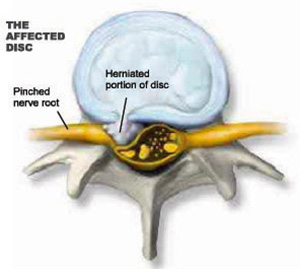
Conditions
Herniated Disc
A ruptured disc, also known as a herniated disc or a slipped disc is a prevalent source of neck, arm, back and leg pain.
Schedule an AppointmentHerniated Disc Symptoms
A ruptured disc, also known as a herniated disc or a slipped disc, can cause hip, lower back, leg and foot pain. The pain can develop gradually or suddenly. It can be sharp or dull, mild or severe, and it may or may not be accompanied by sciatica. Bending over, coughing, even sneezing can make the pain worse.
What Is a Disc Herniation?
A herniated disc occurs when a disc breaks down and starts to degenerate. As the deterioration continues, tears and rips can develop on the outer surface of the disc, allowing the inner core of the disc to leak out through the opening. The damaged part of the disc then puts pressure on the surrounding nerves. Even the slightest pressure on these nerves can bring about severe pain.
What Is Sciatica?
Sciatica is the most common symptom of a herniated disc. If the herniated disc is situated in the lumbar (or lower) region of the back, it can put direct pressure on the sciatic nerve and cause sciatica. The sciatic nerve consists of several spinal nerve branches that extend from the lower spine to the bottom of the feet. When a damaged disc is pressuring the sciatic nerve, a patient can experience weakness, numbness, tingling, burning and pain down the entire length of the leg. Leg pain can occur with or without lower back pain; but if lower back pain is present, the leg pain will almost always be worse. In rare cases, sciatica can bring about a lack of function in a leg. It can also cause a lack of function in the bladder or bowel. Symptoms of sciatica usually occur in one leg only, but sometimes both legs are affected.
Diagnosis
- Thorough clinical evaluation. Complete medical history, analysis of your symptoms, and physical examination.
- Testing may include x-rays, MRI and/or CT scans, and electro-diagnosis (EMG). These advanced diagnostic techniques definitively pinpoint the source of pain.
Herniated Disc Treatment
- Physical therapy, exercise and spinal injections can conservatively treat a majority of disc herniations.
- Surgery should be reserved as a treatment of last resort for those whose pain has not improved or has worsened after six months of noninvasive and nonsurgical treatments.
- Nerve Block
- Radiofrequency Ablation
- Minimally invasive Spine Surgery
- Endoscopic Discectomy
Disclaimer: the content of the Website is for general informational purposes only and does not constitute advice of any kind. See the full User Agreement here.

Take Back Your Life
Fill out the form or simply give us a call to book your appointment and start feeling better.

Contact Us
Speak with one of our team members right away to get answers to your questions about insurance verification, scheduling an appointment, and our clinic locations.
(732) 955-0655Visiting our Book Appointment page you can instantly request an appointment at any of our Seacoast Spine and Sports Medicine. We offer Free Insurance Verification before your appointment.
Learn how to easily get to the Seacoast Spine and Sports Medicine.
